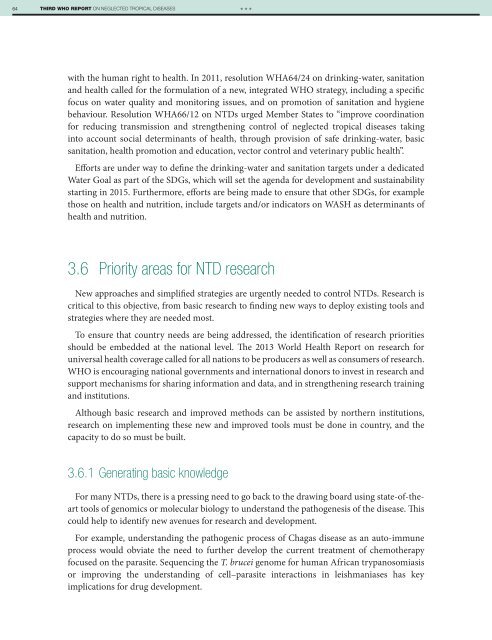1A9bnbK
1A9bnbK
1A9bnbK
Create successful ePaper yourself
Turn your PDF publications into a flip-book with our unique Google optimized e-Paper software.
64 THIRD WHO REPORT ON NEGLECTED TROPICAL DISEASES<br />
***<br />
with the human right to health. In 2011, resolution WHA64/24 on drinking-water, sanitation<br />
and health called for the formulation of a new, integrated WHO strategy, including a specific<br />
focus on water quality and monitoring issues, and on promotion of sanitation and hygiene<br />
behaviour. Resolution WHA66/12 on NTDs urged Member States to “improve coordination<br />
for reducing transmission and strengthening control of neglected tropical diseases taking<br />
into account social determinants of health, through provision of safe drinking-water, basic<br />
sanitation, health promotion and education, vector control and veterinary public health”.<br />
Efforts are under way to define the drinking-water and sanitation targets under a dedicated<br />
Water Goal as part of the SDGs, which will set the agenda for development and sustainability<br />
starting in 2015. Furthermore, efforts are being made to ensure that other SDGs, for example<br />
those on health and nutrition, include targets and/or indicators on WASH as determinants of<br />
health and nutrition.<br />
3.6 Priority areas for NTD research<br />
New approaches and simplified strategies are urgently needed to control NTDs. Research is<br />
critical to this objective, from basic research to finding new ways to deploy existing tools and<br />
strategies where they are needed most.<br />
To ensure that country needs are being addressed, the identification of research priorities<br />
should be embedded at the national level. The 2013 World Health Report on research for<br />
universal health coverage called for all nations to be producers as well as consumers of research.<br />
WHO is encouraging national governments and international donors to invest in research and<br />
support mechanisms for sharing information and data, and in strengthening research training<br />
and institutions.<br />
Although basic research and improved methods can be assisted by northern institutions,<br />
research on implementing these new and improved tools must be done in country, and the<br />
capacity to do so must be built.<br />
3.6.1 Generating basic knowledge<br />
For many NTDs, there is a pressing need to go back to the drawing board using state-of-theart<br />
tools of genomics or molecular biology to understand the pathogenesis of the disease. This<br />
could help to identify new avenues for research and development.<br />
For example, understanding the pathogenic process of Chagas disease as an auto-immune<br />
process would obviate the need to further develop the current treatment of chemotherapy<br />
focused on the parasite. Sequencing the T. brucei genome for human African trypanosomiasis<br />
or improving the understanding of cell–parasite interactions in leishmaniases has key<br />
implications for drug development.


